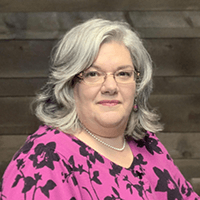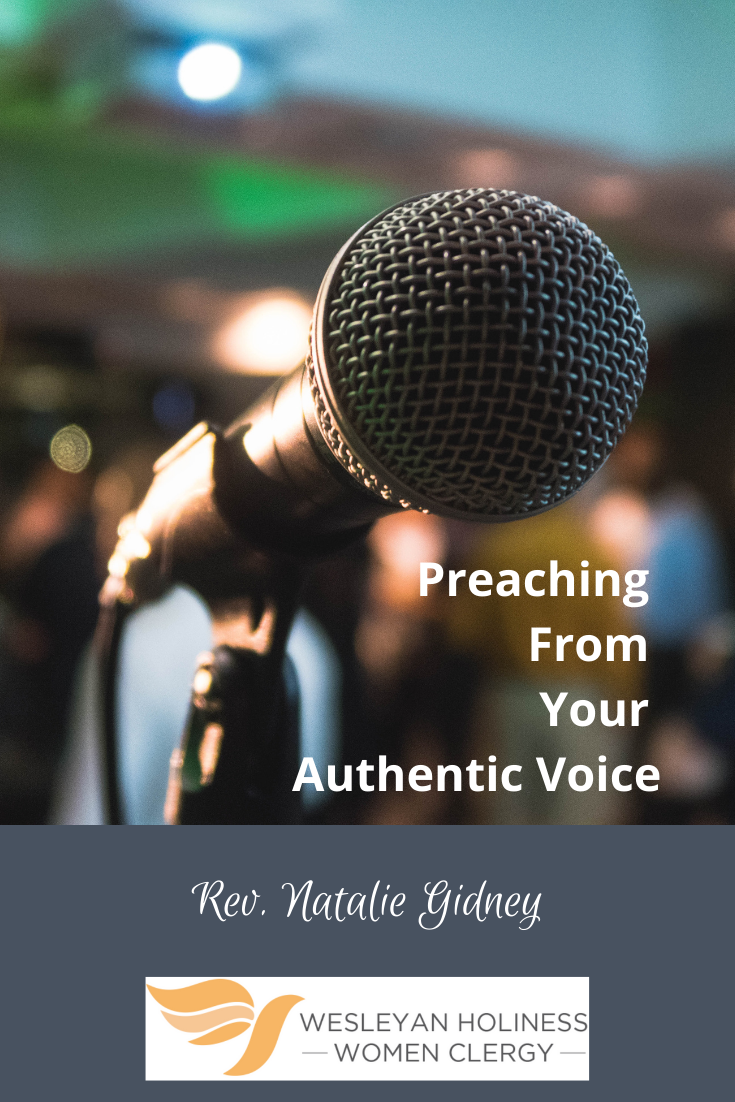Rev. Natalie Gidney is an ordained minister in the Atlantic District of The Wesleyan Church, serving in ministry at Brazil Lake Wesleyan Church in Nova Scotia, Canada. She has four published books in the area of discipleship and a passion to see everyone explore and grow in their God given calling. She loves words! Reading and writing, preaching and teaching are true passions in her life.
Preaching From Your Authentic Voice
Rev. Natalie Gidney • August 18, 2021 | WHWC
God has called you to use YOUR voice.

Not all Voices should Be Trusted
Voices are all around us everywhere. They come from within ourselves and from outside sources, even if we don’t seek them out. If you are a woman pastor who preaches and/or teaches (or are considering this field), your voice is part of your calling. How you train and nurture the voice you speak with matters. God has called you to use YOUR voice, not to become a copycat or imitation of someone else. He has called you to learn to speak with your authentic voice in the places and to the people He has called you to be.
In this world of voices and teaching, with almost unlimited preaching available to us at the touch of a button, how do we find our own unique and authentic voice? We must start with the Truth that each of us have been called by God. We are a cookie cutter of someone else. We have our own unique giftings and qualities. We have to embrace who we are and where we have been planted and truly get in touch with who God has created each of us to be.
God has not called me to be Tara Beth Leach or Jo Saxton nor has He called you to be JoAnne Lyon or Kadi Cole. No, God has called me and you to be exactly who we are. Tara Beth, Jo, JoAnne, and Kadi already have their own ministries and voices. He doesn’t need us to imitate them, He has called each of us to be uniquely our own. He doesn’t need multiples of the same person - He needs us, each one walking in His confidence, by the power of the Holy Spirit to fill the role He has for each of us.
He has great purpose in each one He has called and we must let go of our own fears and anxieties that we are not enough or that He may have made a mistake. That voice that rings in our heads and tells us that we must look like, dress like, walk and talk like someone else is a lie that will keep us from experiencing the fullness of each of our callings.
All this said, He wants to continue to shape and nurture us to be the best versions of ourselves. Keep that in the forefront. You have not been called to be a clone, but fully who He has created you to be. So, what do you think? Are you ready to embrace your authentic voice?
Begin with Prayer & Fasting
This may go without saying but beginning with prayer and fasting is a crucial step in this process. We pray and fast to seek and hear God’s still small voice. We pray and fast to keep all distractions at bay. We pray and fast to break through strongholds and overcome opposition: sometimes that opposition is in the six inches between our ears.
Fasting breaks the ties of bondage and reveals the lies we’ve been believing so we can empty ourselves of the negative junk we’ve been holding onto.
As we begin the process of prayer, and allow things to fall away, the void that has been left from emptying ourselves is wide open to be filled with the transforming power, presence, and truth of Jesus - the One who calls and empowers us. Prayer will guide us to better know His will and the words He wants delivered to His people in His timing.
When we fast and pray, we grow in closer communion with our Lord and Saviour, doing this first is vital to developing our authentic voice because it shoves all the other voices away, except the One that matters most. Clarity comes from time spent with the Lord in both prayer and fasting. No matter how busy life gets, make this practice non-negotiable.
Authentic Preparation & Delivery
Something practical we can work on is developing our own system of preparation and delivery. You may be using something that works great and if so, that’s wonderful. But if you are slogging through each week or month - depending on how often you preach/teach - maybe you need to make some changes to your process. You may be using a process that was taught to you in university or seminary or something you have picked up along the way. If it’s not something you are finding joy in or productive, it’s okay to experiment and try new things so that your time of preparation will be your own.
It’s possible that somewhere along the way, someone gave you some advice on how to proceed but you’ve never quite felt comfortable with it. Tear it down and start from scratch with your own process or keep the things that work and put them together with pieces of other people’s processes to make your own template. You are working to deliver messages that are natural and flow out of you, not a copy of someone else’s.
Remember, this is a process and you must give yourself time to experiment and sometimes even fail. It can be scary and intimidating, but go for it. What if you develop a process that is more fluid and natural for you? That will be a game changer for your comfort level with prep and delivery.
Your comfort level and natural delivery could mean the difference between someone hearing the message and it being planted in good soil which will result in gains for the kingdom rather than rocky soil which could potentially mean losses. Only God knows the full implications.
To be honest, we need to stop being afraid of experimenting and trying something new. We need to stop trying to be someone else and trust God to guide us. You may mess up when you try something new - but you may mess up using tried and tested methods too. What if you hit it out of the park with something you’re really comfortable with? That could be just the encouragement needed to test out other areas.
Mentoring & Feedback
Another piece to finding our authentic voices is determining to surround ourselves with mentors who will speak truth into what we are doing. To be truly effective, these people need to know you and recognize your natural voice. Ideally, it would be a group that is close and has developed deep trust. Many times we can spot imitation in someone else that we can’t always see in ourselves. This can be a helpful tool in recognizing and developing our own voice.
When we consider this, it can be intimidating to hear someone else’s critique of our work. No one likes criticism, however, constructive criticism can be helpful in evaluation of ourselves and to help us develop our authentic voice. Having others who are familiar with us and what we are doing who are also willing to subject themselves to the same critiquing is a priceless way to develop your authentic voice.
Recording yourself and listening with a critiquing ear is also important - though admittedly difficult. Listening for your own intonations, stories, vocabulary, and whether your transitions are clear and smooth, are all important parts of growing in this area. Remember, you are not trying to sound like someone else, but like your true self.
Sometimes, when we are in front of a group, we can almost become a different person: speaking octaves higher or lower, straining our voices, speaking with vocabulary we would never use in conversation. Why? What are we trying to prove? Unless we invest the time to listen to ourselves, we may never recognize these things. Remember, God has called you to this place and time to be you. Be authentic.
At a church I was attending before I was credentialed, I was shocked when the pastor handed out evaluation forms to the congregation. As I looked through the papers, there were even areas where the congregation was asked to critique the sermon delivery. It can be scary to ask for feedback on your sermons, but this too could be a great learning tool.
If you choose to go this way, it is probably best for everyone involved to stay anonymous. This said, some of your best critiques may come from those you are shepherding. Many people have listened to many sermons, and not just yours. They may have a point of view, wisdom, or encouragement to share that you haven’t even considered that will help shape your authentic voice. Remember to take everything and run it through God’s filter first, not just your own. This is not a process meant to drag you down, but to empower you to find your voice. Embrace all the pieces.
Some Closing Thoughts
Developing your authentic voice may be something you’ve worked on or it may be a new concept for you. As you work toward this, remember the power of stories. When we tell a story or share an illustration that is close to our hearts, we let go of our notes and engage with people. We are excited to share it and even the fear we experience seems to melt away.
When you share stories, make sure they’re your own, and if they aren’t, give proper credit for them. Own the illustration or story you are sharing. A good story draws the listener in and prepares the soil of the heart for the planting of seeds of some difficult truths. It can shift the way the message is received and processed by the listener.
As you work in this area and develop your authentic voice, don’t forget to enjoy the journey. The last thing any of us needs is another job to do. This should be a satisfying journey to finding and developing your own voice. It may not be a cakewalk, but will be worth everything you put into it.
You have been called and commissioned by God to share His message with those He puts in your path, whether that is in front of a group of people on a Tuesday night, Thursday afternoon, or a Sunday morning. It could be a group of three, thirty, three hundred or three thousand. No matter the time, place, or size: your voice matters to the Kingdom. Be bold. Be brave. Be authentically you in sharing His message and see what He will do in and through you.
What is the first thing you can do to develop your authentic voice? Who can you recruit as part of your team to help you in this area? Don’t be afraid to approach a few other women pastors and set aside time to meet and discuss this topic. Let’s rise and grow together.
References
Enjoyed this article? Connect with us on one of our social media platforms. Share it and forward it to a friend:

Wesleyan Holiness has a rich and diverse history of women empowered by the Holy Spirit following God in obedience to Him, blocking out the voices of those who didn't embrace or encourage women preachers. Each one of them are the women whose shoulders we stand upon, making way for the next generation of women pastors coming up behind us.

The wonderfully freeing truth we have in the Beatitudes is that they are not a checklist of to-dos and rules to hem us in, keep us in line, or that we must check off. The Beatitudes are words given to us as grace, dripping like honey from a honeycomb with blessing and hope in a desperate and broken world.




